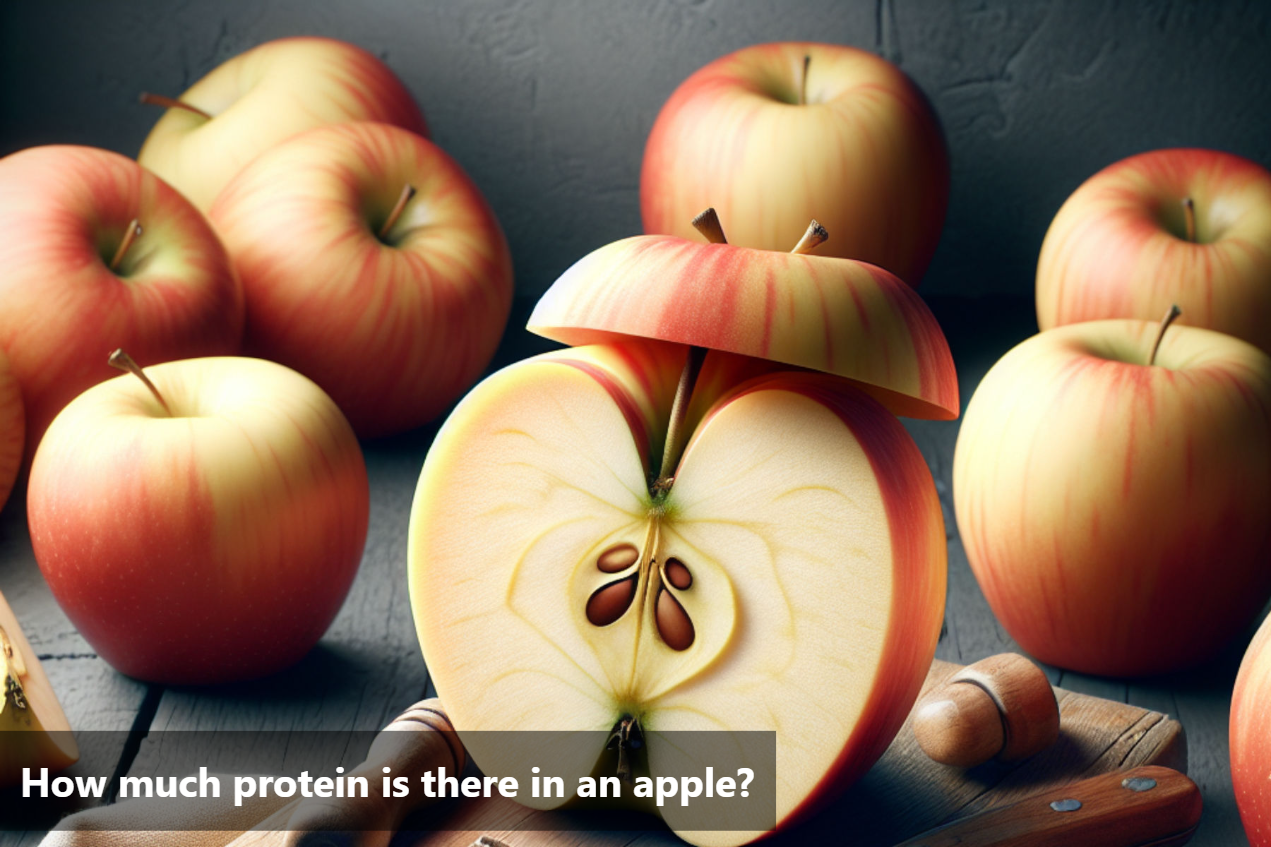
How much protein is there in an apple?
While protein is often associated with animal products, it is essential to explore plant-based sources as well. One such surprising source of protein is apples. Yes, these juicy and crunchy fruits also contain a notable amount of protein, making them a valuable addition to a balanced diet.
When we think of protein-rich foods, apples may not be the first thing that comes to mind. However, it's fascinating to discover that a medium-sized apple contains about 0.5 grams of protein. While this may seem minimal compared to other protein sources, every bit counts towards meeting your daily protein requirements.
Including apples in your diet not only provides you with essential vitamins, fiber, and antioxidants but also contributes to your protein intake. Whether enjoyed as a snack on its own or paired with protein-rich foods like nut butter or yogurt, apples offer a convenient and tasty way to increase your protein consumption.

Nutritional Profile of Apples
One raw, unpeeled, medium-sized apple (182 grams) provides:
Calories |
94.6 |
Water |
156 grams |
Protein |
0.43 grams |
Carbs |
25.1 grams |
Sugar |
18.9 grams |
Fiber |
4.37 grams |
Fat |
0.3 grams |
Health Benefits
Nutrient-Rich: Apples are a good source of several vitamins and minerals, including vitamin C, potassium, and various B vitamins.
High in Fiber: Apples are high in soluble and insoluble fiber, which is beneficial for digestive health. Fiber helps to regulate bowel movements and may help prevent constipation.
Weight Management: The fiber in apples can help you feel full longer, reducing overall calorie intake and assisting in weight management or weight loss.
Heart Health: Consuming apples is linked to a lower risk of heart disease. This may be due to their content of soluble fiber, which helps to lower blood cholesterol levels.
Reduce Diabetes Risk: Eating apples is associated with a lower risk of type 2 diabetes. This might be partly due to their fiber content, which helps control blood sugar levels by slowing down the digestion of sugars.
Bone Health: Certain compounds in apples, such as antioxidant and anti-inflammatory compounds, may promote bone density and strength.
Protect Against Asthma: Studies suggest that the antioxidants in apples, especially vitamin C, can help protect your lungs from oxidative damage and may help reduce the risk of asthma.
Gut Health: Apples contain pectin, a type of fiber that acts as a prebiotic. This means it feeds the good bacteria in your gut, contributing to a healthy gut microbiome.
Brain Health: Some studies suggest that the antioxidants in apples may protect the brain from oxidative stress, reducing the risk of neurodegenerative diseases like Alzheimer's.
Cancer Prevention: Research has linked the consumption of apples with a reduced risk of certain cancers, thanks to their antioxidant and anti-inflammatory properties.
Ways to Increase Protein Intake with Apples
When it comes to boosting your protein intake with apples, there are various delicious and nutritious ways to incorporate them into your diet.
One simple yet effective method is to pair your apple slices with a serving of nut butter. This combination not only enhances the flavor but also adds a healthy dose of protein to your snack.
Furthermore, you can elevate the protein content of your apple snack by dipping apple wedges into Greek yogurt. Greek yogurt is well-known for its high protein content and creamy texture, making it a perfect complement to the natural sweetness of apples. This mix provides a satisfying and nutrient-rich snack option that can be enjoyed any time of the day.
For a more filling protein-packed meal, consider adding chopped apples to your salad along with grilled chicken or chickpeas. The crunchiness of the apples paired with the savory protein sources creates a well-balanced and flavorful dish that is both satisfying and nutritious.
Incorporating apples into your high-protein diet not only diversifies your nutrient intake but also adds a refreshing twist to your meals and snacks. Experiment with different combinations and recipes to find the perfect apple-protein pairings that suit your taste preferences and dietary needs.

Exploring Protein in Apples: All You Need to Know
It is evident that apples are a valuable addition to any balanced diet due to their numerous nutritional benefits, protein content, and versatility. Apples are not only a good source of fiber, vitamins, and minerals but also contain a surprising amount of protein. While apples are not commonly associated with high protein content, they can still contribute to your daily protein intake.
When considering how much protein is in an apple, it is essential to note that a standard-sized apple contains approximately 0.5 grams of protein. While this may seem low compared to other protein-rich foods, every bit counts towards meeting your daily protein requirements.
By incorporating apples into your diet, whether as a snack, in salads, or paired with protein-rich foods like nut butter or yogurt, you can boost your overall protein intake in a delicious and nutritious way. In essence, the humble apple offers more than just its sweet flavor. Its nutritional benefits, combined with its protein content and culinary versatility, make it a fruit worth including in your daily meals for a well-rounded and healthy diet.
This Blog post is an initiative by Lo! Foods, to provide accurate and Nutritionist / Doctor approved information related to Health. Lo! Foods is India's leading brand for Everyday Functional Foods. Foods designed for specific Health conditions or Needs. Lo! Foods also runs India's largest range of Low Carb Healthy Cloud Kitchens, under the brand names of Lo!, ProteinChef, ATH (All Things Healthy) and DiabeSmart.















Leave a comment
Your email address will not be published.